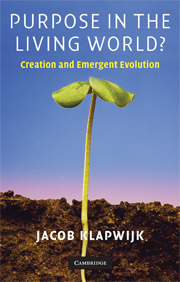Book contents
- Frontmatter
- Contents
- List of figures
- Preface
- Introduction
- 1 Does life on earth have a purpose?
- 2 Creationism, Intelligent Design, and Augustine's idea of time
- 3 Darwin, neo-Darwinism, and the naturalistic continuity claim
- 4 Miller's pre-biotic broth and the premises of evolutionism
- 5 A cold shudder along Darwin's back
- 6 The emergence theory of Morgan and Alexander
- 7 Luctor et emergo: what is emergent evolution?
- 8 Toward a general theory of emergent evolution
- 9 Hominization and the philosophy of mind
- 10 Augustinian faith and evolutionary science
- 11 The organism is a whole. The world is a habitat
- 12 The slumbering temptation of essentialism
- 13 Questions surrounding the emergence process
- 14 Enkapsis in nature. Is there an Omega point?
- Bibliography
- Index
6 - The emergence theory of Morgan and Alexander
Published online by Cambridge University Press: 05 June 2012
- Frontmatter
- Contents
- List of figures
- Preface
- Introduction
- 1 Does life on earth have a purpose?
- 2 Creationism, Intelligent Design, and Augustine's idea of time
- 3 Darwin, neo-Darwinism, and the naturalistic continuity claim
- 4 Miller's pre-biotic broth and the premises of evolutionism
- 5 A cold shudder along Darwin's back
- 6 The emergence theory of Morgan and Alexander
- 7 Luctor et emergo: what is emergent evolution?
- 8 Toward a general theory of emergent evolution
- 9 Hominization and the philosophy of mind
- 10 Augustinian faith and evolutionary science
- 11 The organism is a whole. The world is a habitat
- 12 The slumbering temptation of essentialism
- 13 Questions surrounding the emergence process
- 14 Enkapsis in nature. Is there an Omega point?
- Bibliography
- Index
Summary
The theory of emergence is inseparably connected with the names of two philosophers of the early twentieth century: Conwy Lloyd Morgan (1852–1936) and Samuel Alexander (1859–1938). Morgan and Alexander were proponents of evolution in the spirit of Darwin. However, they introduced the concept of emergent evolution in order to oppose the reductive tendencies that were already becoming apparent in evolutionistic circles of their time.
Since the time of Morgan and Alexander the topic of emergence has been put on the agenda repeatedly not only by philosophers of science, systems theorists, and process thinkers but also by biologists, physiologists, and paleontologists. In the first group are authors such as R. Woltereck, B. Bavink, L. von Bertalanffy, M. Polanyi, A. N. Whitehead, K. R. Popper, J. R. Searle, and P. Checkland. In the second category I include scholars such as J. S. Haldane, L. J. Henderson, W. B. Cannon, J. C. Eccles, F. Jacob, T. Dobzhansky, G. L. Stebbins, S. A. Kauffman, W. H. Thorpe, S. J. Gould, and N. Eldredge.
Following in the footsteps of Morgan and Alexander all these people have argued, from various angles and with different arguments, for the notion of emergent evolution and they have made evolutionary naturalism with the accompanying reductionism an object of their criticism. They have raised such questions as these: is reductive naturalism in agreement with the complicated nature of the living world?
- Type
- Chapter
- Information
- Purpose in the Living World?Creation and Emergent Evolution, pp. 90 - 102Publisher: Cambridge University PressPrint publication year: 2008

